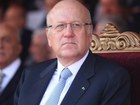Members of the Bkirki committee tasked with studying the best representation of Christians in the 2013 parliamentary elections agreed late Friday to prepare a study on three draft-laws proposed to the parliament after wrangling between the March 8 majority and March 14 coalition MPs over the conflicting proposals.
The members of the committee, who met under Maronite Patriarch Beshara al-Rahi, agreed to study the proposal of the government, another draft-law referred to parliament by March 14 opposition Christian lawmakers, and a plan suggested by Free Patriotic Movement chief Michel Aoun’s Change and Reform bloc that would allow every sect to elect its own MPs under a proportional representation system with Lebanon as a single district.
 Full Story
Full Story
The Internal Security Forces confirmed on Friday that gunmen assaulted one of its patrols as it was attempting to prevent individuals from illegally cutting down trees for firewood in the town of Almat, Jbeil.
Chief of police Joseph al-Duweihi said in a press conference that some 20 gunmen assaulted the patrol, stealing some of their weapons.
 Full Story
Full Story
Lebanon has ignored repeated requests to cooperate with the Special Tribunal for Lebanon probing former Premier Rafik Hariri's 2005 murder, defense lawyers said Friday.
Lawyers also lambasted prosecutors before the tribunal for delays in handing over evidence they needed for the trial in absentia of four Hizbullah members accused of involvement with the bombing.
 Full Story
Full Story
Lebanese Forces leader Samir Geagea stated on Friday that the government proposal over the parliamentary electoral law and the one suggested by the MPs Georges Adwan, Sami Gemayel, and Butros Harb are the best current offers on the matter, saying that the Free Patriotic Movement has to choose one of them.
He said during a press conference: “The FPM however is more concerned with harming the interests of the Progressive Socialist Party leader MP Walid Jumblat and the Mustaqbal Movement to take into consideration Christian concerns in the elections.”
 Full Story
Full Story
The Maronite bishops council hoped on Friday that officials would set as a priority reaching an agreement over a new parliamentary electoral law, stressing that the elections should be held on time.
They said in a statement after their monthly meeting: “We believe it is our national duty to reject the 1960 electoral law because it does not ensure fair representation.”
 Full Story
Full Story
Three prisoners were hospitalized in the eastern city of Zahle for self-harm with sharp objects, the state-run National News Agency reported on Friday.
NNA said the three inmates, who were jailed on drug charges in the Zahle prison, were transferred to the Justice Palace jail after a guard heard them hitting on the wall on Thursday night .
 Full Story
Full Story
Head of the international tribunal's defense office Francois Roux is expected to arrive in Beirut in the coming week to meet with senior Lebanese officials.
According to An Nahar newspaper published on Friday, Roux will hold talks with several politicians, diplomats and Head of Beirut Bar Association Nuhad Jabr and Head of Tripoli's Bar Association Bassam Dayeh.
 Full Story
Full Story
Prime Minister Najib Miqati stressed on Friday that Iranian Revolutionary Guards are not present in Lebanon, saying that the Lebanese army is keen to safeguard the country.
“We were reassured that the Guards are not present in Lebanon, and the statements concerning their presence were referring to a previous period and they are currently in Syria not in Lebanon,” the PM said in comments published in the pan-Arab daily al-Hayat.
 Full Story
Full Story
Speaker Nabih Berri has announced respect for the viewpoint of all parties that have proposed electoral draft-laws but he remains adamant on the adoption of Lebanon as a single electoral district, his sources and An Nahar daily reported.
Berri met on Thursday with a ministerial delegation from the Progressive Socialist Party that said the speaker expressed “openness” to hear the suggestion of all sides on a law for the 2013 parliamentary elections.
 Full Story
Full Story
Prime Minister Najib Miqati called on the international community on Thursday to help Lebanon tend to the influx of Syrian refugees fleeing the violence in their country while reaffirming the Lebanese state's policy to distance itself politically from the crisis in Syria.
“Lebanon reaffirms its disassociation policy on both the political and security levels in order to maintain stability and avoid related consequences and risks,” he told the 67th General Assembly session at the U.N. headquarters in New York.
 Full Story
Full Story



